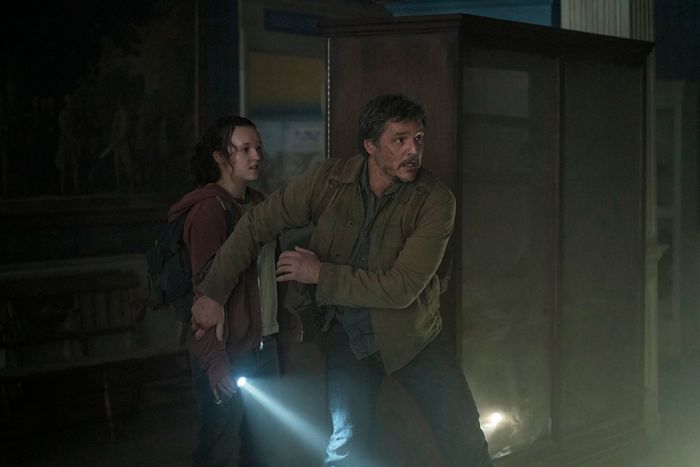
Gamers have had this Sunday’s premiere of The Last of Us circled on the calendar for months. There’s been a lot of hope that this (very good!) TV series could successfully adapt a video game often regarded as one of the best of all time, in a medium that is, uh, not always known for successful or respectful video-game adaptations.
Everyone else, however, might have some questions. If you’ve seen a poster of a gruff dude and an adolescent girl frowning in front of some collapsing skyscrapers, or a trailer with a bunch of creepy fungus guys sprinting toward the camera, you might not know what to make of a series that is clearly being positioned as HBO’s belated answer to The Walking Dead.
Since you’re reading an article about what you need to know about The Last of Us, I’m going to offer some weird-sounding advice: You do not need to know much about The Last of Us the game before you watch The Last of Us the series. In fact, you should be extremely careful what you read about The Last of Us. As anyone who played the original video game (or its sequel) will tell you, this is definitely a story best experienced unspoiled — and since the show is sticking so closely to its source material, pretty much anything you learn about the game (or its sequel) will alter your entire experience of the story.
Here’s what is safe to say: From the day it was published in June 2013, The Last of Us has been widely regarded as a landmark in video-game storytelling. Plenty of games had already borrowed the techniques and tropes of film storytelling to bring their stories to life — including Uncharted, the previous game series from TLOU developer Naughty Dog, which more or less openly riffs on Indiana Jones — but The Last of Us arrived with a confidence and self-seriousness that stood out. Its story, and the gloomy, post-cataclysm America in which it takes place, was crafted with uncommon care. The script and the motion-captured actors brought on to act it out, especially lead actors Troy Baker and Ashley Johnson, felt unusually textured and authentic. And the score kicked ass.
Apart from the identities of the lead actors — now Pedro Pascal and Bella Ramsey, both vets from fellow HBO genre swing Game of Thrones — none of that has changed. There is a reason why a network as prestige-driven as HBO was interested in this material in the first place, and why Neil Druckmann, the creative director on both Last of Us and its more divisive 2020 follow-up, had enough clout to play a leading creative role on the TV series as well. We’re many years past the hilarious nightmare of the live-action Super Mario Bros. movie, which seemed deliberately designed to confuse or terrify kids who loved the games, but The Last of Us has so much fidelity to its source material that it’s a little startling. If it’s a hit — and it certainly feels like one — it will also become a landmark in small-screen video-game adaptations, convincing nervous executives to spend the money necessary to tell these stories with the fidelity fans expect. Shows based on hit PlayStation series Horizon and God of War are already in the works at Netflix and Amazon, respectively, and you can bet they’ll follow the same path.
With that fidelity in mind, there’s another question facing non-gamers who tune in for The Last of Us: Is it better to let the TV show’s story unfold on its own terms, or play the video game and experience the story as it was originally told? It’s a lot like the conundrum presented by Game of Thrones, which had an audience divided by those who had read the books and those who hadn’t, with the latter constantly at risk of getting something spoiled if they didn’t binge-read A Storm of Swords. And like Game of Thrones, there are good arguments for rushing out and binge-playing The Last of Us right now, and good arguments for treading carefully while clearing your Sunday-night viewing calendar for the next nine weeks.
The video game is still great, although neophyte players may struggle with it; the combat is designed to be tense and brutal, and resources are intentionally scarce. The developers wanted players to experience those feelings, and no version of this show, no matter how well executed, could summon up the panic of controlling the guy being overwhelmed by ghouls that are trying bludgeon or bite him to death.
But the vestigial tail of The Last of Us’s games-by-way-of-cinema storytelling remains in the noninteractive parts. Personally, I like the show least when it’s parroting scenes from the game, complete with identical dialogue and camera angles. Having played through the game several times — most recently in the prettier but largely unnecessary remake that dropped for PlayStation 5 last September — it was weird to see the TV show throw up shot-for-shot re-creations of moments I remembered playing, like I’d accidentally stumbled onto a YouTube “Let’s Play” channel.
Fortunately, those moments are relatively rare. Having brought this story to the small screen, the creative team behind The Last of Us has also found clever ways to blow it out, dropping the locked-in perspective of a player-controlled protagonist to unfold stories that were only hinted at in the original video game. It’s a faithful but expansive approach to adaptation, and it should tantalize fans of the game as much as it inspires viewers to check out the original. And maybe that’s the real thing you need to know about The Last of Us: There’s no bad way to experience a great story.




